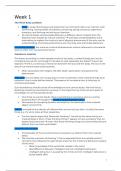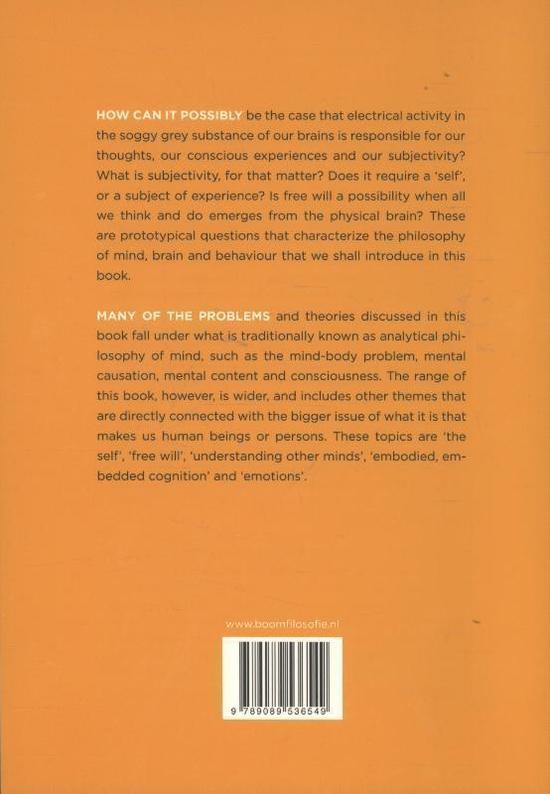Week 1
The Mind-Body problem
Mind: a range of processes and states that we commonly refer to as ‘mental’, such
as thinking, having beliefs and desires, perceiving, being conscious, experience
emotions, and forming and acting on intention
Do mental states and processes belong to a different realm of reality than the
physical realm studies by natural sciences? scientists and philosophers think
attempting to explain the mind as a set of physical phenomena it the only way for
understanding what these phenomena are, how they exist and shape behaviour
Mind-body problem: the mind as a natural phenomenon without reference to immaterial
souls or other non-natural phenomena?
Substance dualism
The theory according to which people consist of two parts, a material body part and an
immaterial soul which are thought to be able to exist separately but doesn’t have to be
separate. There is a continuous interaction between the soul and the body. The soul is the
seat of out mental states and processes.
Often associated with religion, life after death, spiritualism and paranormal
phenomena
Descartes: the soul does not occupy space, it has no extension. Only material things have
extension, that is what defines matter. The essence of immaterial soul is thinking: all
conscious processes
Such foundations should consist of knowledge that we cannot doubt. We find this by
doubting everything we presume we know, in the hope that we come across a piece of
knowledge we cannot possibly doubt
One thing we cannot doubt: there is something or someone who is currently
doubting (form of thought) I think (I doubt) therefore I exist
His reasons for accepting dualism are based on the assumption that material
object cannot think
Leibniz: principle of the identity of indiscernible: we can only say that x is really the same
thing as y, if x and y share all their properties.
Can be used to argue that Descartes’ thinking ‘I’ cannot be the same entity as a
material body or brain. These thinking things ‘I’ appear to have a property that our
bodies and brains lack mean that these thinking things must be entities that are
distinct from our brain and bodies
Cartesian view of mind:
Immateriality of the soul (and hence its existence as distinct from the material
body)
The mind as a domain of thinking ‘I’ that is separated from the outside world. It
connects only indirectly through senses (input for the mind) and behaviour (output
of the mind
o Ideas: knowledge of the world that resides in the mind
o Real difference between intelligent and non-intelligent behaviour:
intelligent behaviour is caused by the mind and non-intelligent behaviour is
purely bodily affair
1
,Anti-Cartesian: opposing the idea that people consist of two separable parts and that they
do not believe in an immaterial soul
Problems with arguments for dualism
Computers can reason and produce and understand language
In order for there to be identity, the thinking entity must share all her properties
with her brain and body this argument does not really show that accepting
substance dualism is inescapable
o What someone is entitled to think about x, should not be considered a
property of x the sense of Leibniz’ principle of the identity of indiscernible
Ontology: study what really exists
Epistemology: study of what we know and how we can know it
Distinction between mind and body in terms of what we can doubt is an
epistemological distinction. It is between about the mind and the body as we know
them. The argument for substance dualism based on doubt fails because it draws
an ontological conclusion form an epistemological difference
The interaction problem
Argument for dualism stems from the interaction problem: How is t possible that the
immaterial soul without extension can interact with material substances (brain, physical
world)?
Princess Elisabeth of Bohemia questioned: how can an immaterial soul cause a body to
move as in when someone moves her arm voluntarily?
Descartes: the fact that we do not know how the soul and the body interact does
not mean there is no interaction; we know there is
We now have reasons to believe that an explanation of the influence of an immaterial
entity on physical processes will never be possible causal closure of the physical realm:
the occurrence of every physical event has a complete physical explanation
Logical behaviourism – define the mind in terms of behaviour
There became methodological problems with introspection: introspective reports can
never be verified or falsified by others. Watson recalibrated psychology as science of
behaviour (behaviourism) the soul, mind, consciousness was banned as being
unscientific.
This was later further developed by Skinner resulting in the fact that the mind was made
something of a scientific taboo by the early 1940’s didn’t change the way people spoke
and thought about the mind produce a dilemma: the way we use psychological
terminology in daily life escaped scientific scrutiny
Ryle published his book The Concept of the Mind: showed that the dilemma is the direct
consequence of the fact that our thinking about the mind is still deeply Cartesian
Alternative way of thinking about the mind: logical behaviourism. The idea that intelligent
behaviour is characterized by its specific causal origin: para-mechanical hypothesis: the
mind controls behaviour causally, but behaviour is not part of the mind behaviourist
psychology which merely studies behaviour foregoes the mind
Ryle’s aim: attack the para-mechanical hypothesis. Wants to show the Cartesian
conception of mind is nonsensical and that behaviour is an integral part of our concept of
mind.
2
, What can explain the difference between the classes (intelligent vs. non-intelligent) of
behaviour?
Explanation offered by para-mechanical hypothesis: to portray the mind as some
kind of puppeteer that causally controls the second kind of behaviour
o If we are already able to make the distinction between behaviour, for what
do we need the causal foundation?
Mind’ as a set of behavioural dispositions
Developing the idea that the mind is part of our behaviour and not the causal engine
behind it takes up virtually the entire book the concept of mind. Ryle analysis classes of
mental concepts (thinking, willing) and shows that these concepts don’t refer to processes
in some unobservable entity. We use these concepts to refer to specific tendencies to
display specific behaviour in specific circumstances. These tendencies are dispositions
Arguments against logical behaviourism
Actor who is able to mimic pain behaviour perfectly: constrain herself at moments
when this seems appropriate, unable to prevent herself from screaming when
someone touches the sore spot, responds to pain killers but feeling nothing
Someone who is able to withstand pain so she shows no signs of being in pain
even though from the inside, she is in agony
Mental holism: behaviour is always connected to not just one but to a network of
many mental states. This undermines the one-to-one connection between mental
states and behavioural disposition that logical behaviourism presupposes
Connection between mind and behaviour is not causal but conceptual. The fact
that there is a conceptual connection does not preclude the fact that intelligent
behaviour may have a different cause than non-intelligent behaviour, and the
causes of intelligent behaviour may well be referred to as ‘the mind’
The identity theory – the mind being located in an immaterial soul
Boring suggested that consciousness can be understood as a brain process. Philosopher
Ullin Place Rediscovered Boring. He was inclined to think there is a conceptual connection
between mental states and behaviour, but he was also convinced that logical
behaviourism fails as an explanation of consciousness the pain examples. Boring
convinced Place that as far as consciousness is concerned, the identity theory is the best
alternative for substance dualism
Consciousness as a brain process – what do we mean when we say that consciousness is a
brain process?
‘Is’ is used to indicate identity. It stands for constitution, not for definition
Consciousness is a brain process is to say that consciousness is constituted by a
brain process. We can say that the Eiffel tower is constituted by a set of iron beams,
but just as we cannot define the Eiffel tower as a set of iron beams, we can not
define consciousness as a brain process.
Mentalistic language is topic neutral
Place’s position is further developed by Smart. He applies the identity theory not also to
consciousness, but to the entire mind. He emphasized that the identity theory is a theory
that is made plausible by scientific research
3






